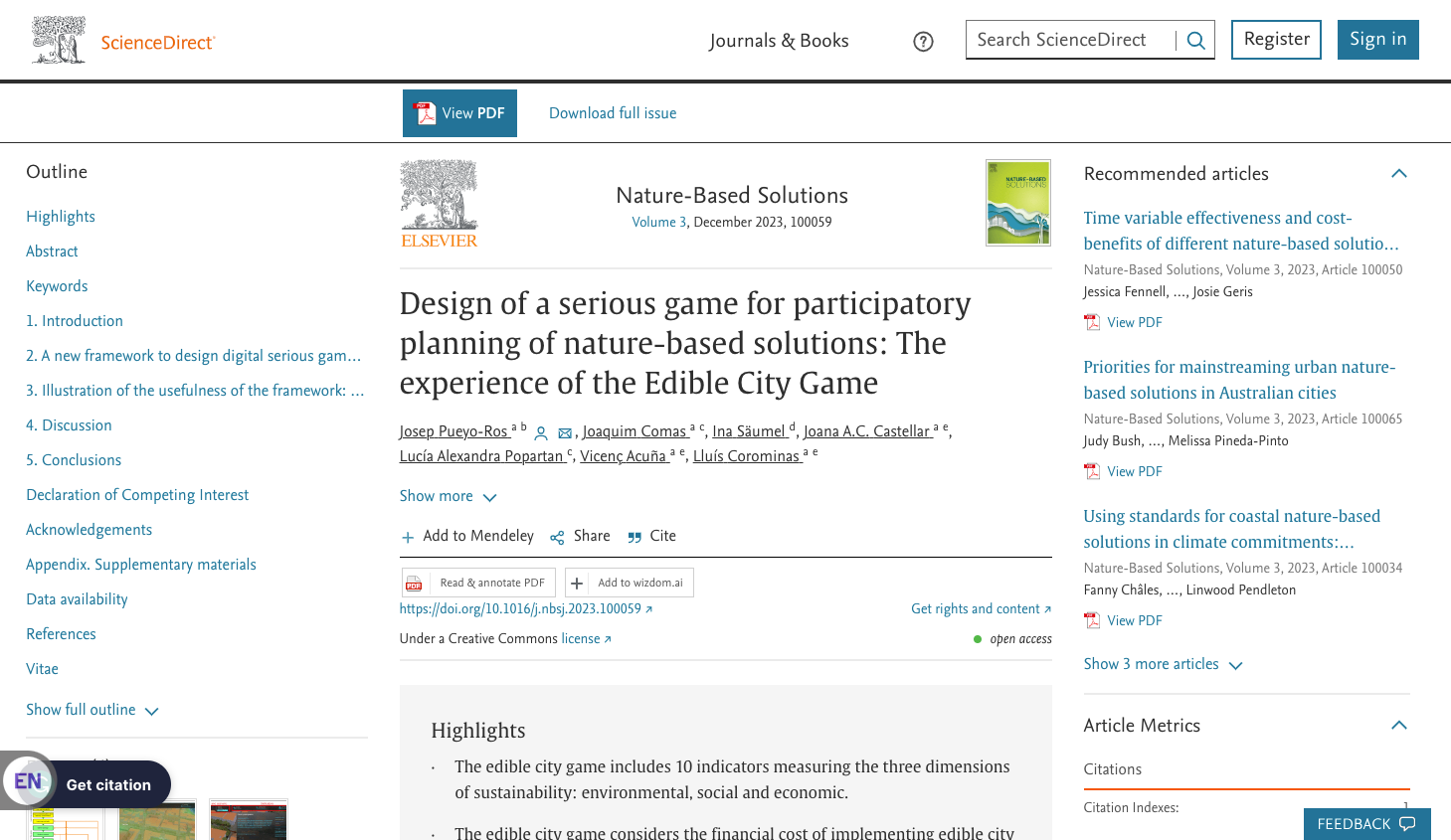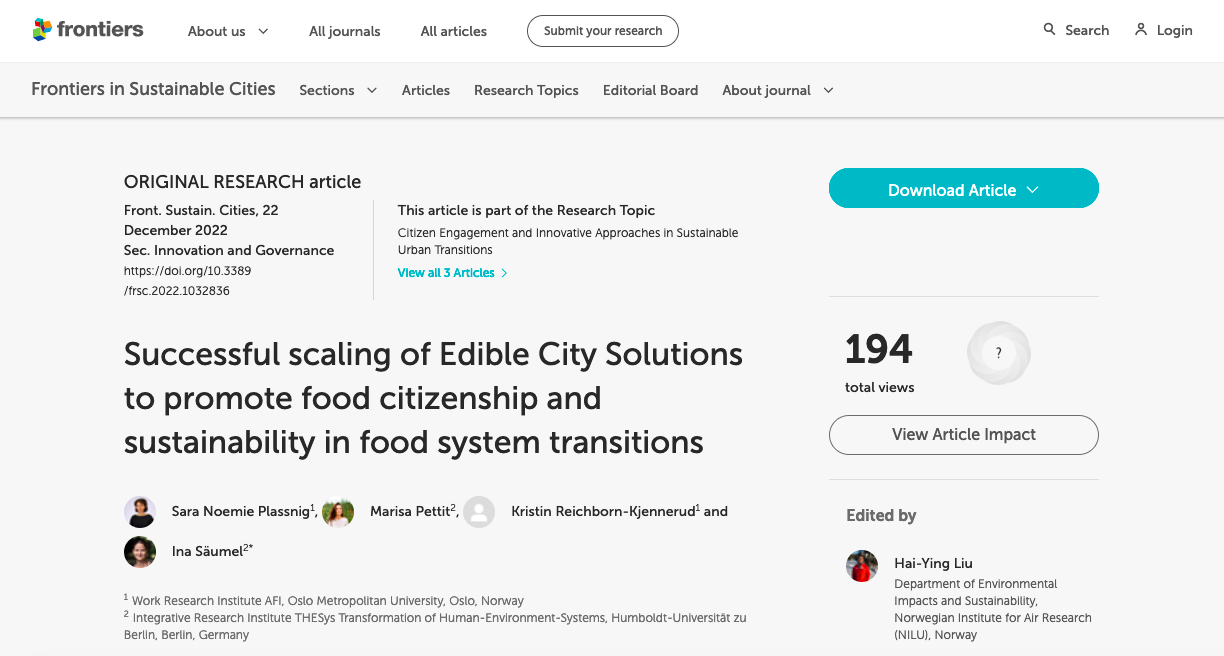Scientific Publications
Design of a serious game for participatory planning of nature-based solutions: The experience of the Edible City Game
03.2023
Serious games have been proposed by several studies as a tool to foster civic participatory processes. However, such an endeavour is often prone to failure due to lack of funding or lack of skills on designing serious games. In response to this problem, this paper provides a novel framework for the design of serious games for participatory planning of nature-based solutions, which provides guidance for the definition, content, and evaluation steps. The usefulness of the framework is illustrated with the design of the Edible City Game (ECG), a digital serious game for participatory planning of edible city solutions (urban nature-based solutions with a food component). The designed ECG was then implemented in Tygron, a platform which provides a graphical interface for serious games for urban planning. However, although Tygron provides a user-friendly software to design serious games, our thesis is that the final product still needs a proper design-orientated process to fulfil its purpose. We believe that this framework, as well as our experience using the Tygron platform, can be of great utility to both researchers and practitioners that have considered using serious games in their projects but discarded the idea because of the foreseen resource intensity of the endeavour.
Successful scaling of Edible City Solutions to promote food citizenship and sustainability in food system transitions
22.12.2022
Sustainable, productive and biodiversity-friendly urban landscapes are a strategic step in transitioning to future-proof, liveable and healthy cities Edible nature-based solutions, otherwise known as “Edible City Solutions”, comprise a wide range of different forms of sustainable urban food production, distribution and consumption which use innovative principles of ecological design combined with closed material and energy flows. Edible City Solutions contribute to a local green economy, reduce cities’ overall ecological footprint, enhance social cohesion, human health and well-being and contribute to bridging the gap between “farm and fork”. These benefits have been tested and monitored in Living Labs where a wide portfolio of different solutions have been implemented and scaled in order to accelerate their uptake and use in urban landscapes. The study documents and analyses different scaling practices and activities of the co-created Living Labs – together with local actors within the “scaling community” in Andernach, Berlin, Havana, Oslo and Rotterdam. We follow a mixed method approach and analyse data by applying the different scaling pathways of scaling up, scaling deep, scaling wide, scaling across and scaling soft previously identified through a systematic literature review. Results are presented as ongoing scaling stories, experiences and challenges in the Living Labs. The study also highlights examples of scaling practices beyond the Living Labs and suggests strategic plans for future scaling. Scaling processes, strategies and approaches are critically reviewed and discussed. Observations are condensed into eleven recommendations for scaling edible nature-based solutions.
Let’s Do It Online?! Challenges and Lessons for Inclusive Virtual Participation
16.05.2022
In this paper, it is aimed to shed light on the potentials and trade-offs in shifting to online participation and who gets to participate under digital Participatory Action Research (PAR) circumstances. The authors used a mixed-methods approach to evaluate the planning progress and the transition to working online in the six cities during the first wave of the pandemic. The study identifies critical implications of COVID-19 on participatory planning processes, the challenges for online participation, and the effectiveness of measures applied to tackle those challenges. The transition to online participatory planning described in this paper emphasizes organizational rather than technical remedies. While the planning progress in all cities was delayed, some faced significant challenges in the transition to online due to the lack of technical or community capacities. This was fostered through the diverse and new realities of the stakeholders ranging from meeting existential needs to adapting to alternative forms of working and caring. The reflections in this paper offer learnings from the disruptions caused by COVID-19 to better understand how participatory planning processes can be managed online along the lines of equity, access, and participation. The findings demonstrate how participatory processes in the ongoing crisis can be maintained, with relevance to future waves of this and other pandemics.
Monitoring people’s motivations to participate in an urban neighbourhood and community garden
2022
Public health science has clearly documented that participation in voluntary work and social inclusion can contribute to increased quality of life. In 2020, two master’s students at the Norwegian University of Life Sciences (NMBU) investigated the significance of Linderud neighbourhood and community garden (site of the EdiCitNet Living Lab in Oslo) for the health and quality of life of its users. They gained insight into various motivating factors that the participants themselves defined as significant for their involvement in the garden.
Nature-based solutions coupled with advanced technologies: An opportunity for decentralized water reuse in cities
Decentralized water reuse in cities is a prominent alternative to mainstream top-down models for urban water treatment, which are based on centralized, linear dynamics of resource management. In this sense, Nature-based Solutions (“green” technologies) coupled with advanced technologies (“grey” technologies) constitute a promising approach for fomenting onsite water treatment and reuse in cities, while also providing multiple co-benefits. This article puts forward a conceptual advancement by providing a better understanding of coupled “green-grey”/“grey-green” technologies (CGGT).
Nature-based solutions in the urban context: terminology, classification and scoring for urban challenges and ecosystem services
The concept of Nature-Based Solutions (NBS) has emerged to foster sustainable development by addressing social, economic, and environmental urban challenges. However, there is still a considerable lack of agreement on the conceptualization of NBS, especially concerning typologies, nomenclature, and performance assessments in terms of ecosystem services (ES) and urban challenges (UC). Therefore, this article consolidates the knowledge from 4 European projects to set a path for a common understanding of NBS and thus, facilitate their mainstreaming.
Evaluating the impact of nature-based solutions: A handbook for practitioners
04.05.2021
This Handbook aims to provide decision-makers with a comprehensive NBS impact assessment framework, and a robust set of indicators and methodologies to assess impacts of nature-based solutions across 12 societal challenge areas. Indicators have been developed collaboratively by representatives of 17 individual EU-funded NBS projects and collaborating institutions, as part of the European Taskforce for NBS Impact Assessment. They reflect the state of the art in current scientific research on impacts of nature-based solutions and valid and standardized methods of assessment, as well as the state of play in urban implementation of evaluation frameworks.
Beetles in an urban community garden can indicate global warming
2021
Beetles were surveyed using pitfall traps in the EdiCitNet Living Lab in Andernach, Germany.
Two years of data revealed a beetle fauna characteristic of sandy, warm and dry habitats. Sporadic findings include species typical for the Mediterranean










